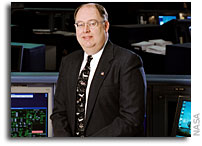Wayne Hale’s NASA Blog: Why does Rice Play Texas?

I wrote this note to the shuttle team in 2004. I think it is still true today. Maybe more so than in 2004. Rice vs. K State tonight at Reckling Park in the NCAA regional baseball playoffs. Texas has already advanced to the super-regionals facing TCU. Why do we care? Read on:
This note is not about really sports but about exploration. Let me tell you why.
JFK was on a roll. He could move a crowd with a speech. He knew what would excite an audience and he could build on their emotion. It was a hot summer day in Houston and the event was outdoors at Rice stadium. The President had come to town to elaborate on his space exploration initiative. He talked about the technical challenges, like the requirement for materials to withstand temperatures of several thousand degrees, or “almost as hot as it is here today” he quipped. Then he came to the centerpiece of his speech:
SOME PEOPLE ASK, WHY GO TO THE MOON?
THEY MAY WELL ASK, WHY CLIMB THE HIGHEST MOUNTAIN?
WHY 35 YEARS AGO, FLY THE ATLANTIC?
WHY DOES RICE PLAY TEXAS?
At this point the crowd which contained many university alumni, faculty, and students started cheering. But JFK knew better than to slow down; without a pause he continued:
WE CHOOSE TO GO TO THE MOON
The cheering intensified, not cheering about a football team but about a new goal
WE CHOOSE TO GO TO THE MOON AND DO THE OTHER THINGS, NOT BECAUSE THEY ARE EASY BUT BECAUSE THEY ARE HARD
BECAUSE THAT CHALLENGE IS ONE WE INTEND TO WIN
At one time, during the 1920’s and 30’s there was parity in football in the Southwest Conference; Rice won its share of the championships and on any given Saturday in the fall any team had the potential to beat any other team. But after WWII the University of Texas took off in size and came to dominate football in the region. Rice earned the dubious honor of becoming the smallest school in the nation to play Division I sports.
Logically, mathematically, analytically, Rice should never beat Texas. With a regular period, the Rice University faculty debates giving up football – or all Division I athletics – as a waste of time, money, and effort.
And when the historians replay the tape of JFK’s speech, they generally clip out the phrase ‘WHY DOES RICE PLAY TEXAS?’ perhaps because the reference may be obscure to some people, perhaps because it seems less important than Lindbergh flying solo across the Atlantic. But if that phrase is clipped out, I submit you may miss the point.
Texas dominates the series 64-21-1. The conferences have changed and the two teams don’t play every year, and when they do, it doesn’t count for conference standings.
Logically, mathematically, analytically, there is no point for Rice to play Texas.
But about once a decade, the illogical happens: the underdog triumphs. Facing the challenge makes a fundamental change in the people who face that challenge.
George Mallory was one of the early explorers to attempt to climb Mount Everest, the penultimate “highest mountain”. When they asked him why, Mallory’s reply became legendary: “Because its there”. But that reason smacks of adolescence, it fails to describe any compelling value. George Mallory died on the slopes of Mount Everest. Tinzing Norgay and Edmund Hillary made the first successful assault of the world’s highest mountain. Later Hillary spoke about the experience: “It is not the mountain that we conquer, but ourselves”.
The Universe neither knows nor cares if we boldly explore or silently fade from the scene.
But we know.
The point is what the challenge does to us. There is nothing “virtual” about being on the mountain peak, or on the lunar surface. The challenge changes us and that may very well be the most important thing of all.
JFK spoke about the challenge of the lunar program as being a measure of us as a people; could we meet the challenge.
Today, we are facing another space exploration initiative and the challenge is the same. Exploring the space frontier is extremely difficult, saturated with risk, immensely challenging. Our part is to fly the Space Shuttle safely soon. It is a formidable challenge. But everyone from the President down tells us that demonstrating that we can meet this challenge is the necessary cornerstone to all that may come afterward. Flying the shuttle safely and completing the International Space Station will demonstrate that we – our agency – our nation – has the competence to continue on and roll back the frontiers. Meeting this challenge will change us.
Somebody recently wrote that this was a poor reason to explore space. There are many reasons to explore space. I’ve written a number of posts providing various reasons, some intensely practical, some more philosophical. Go ahead and look back over the record here.
But challenging the best in ourselves to do something hard; that is not an inconsiderable reason either.








